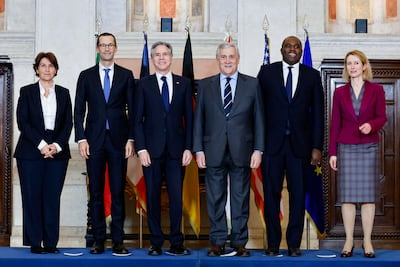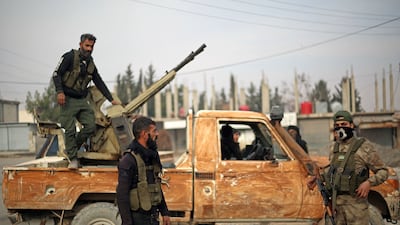Britain’s Foreign Secretary is to make a diplomatic push in the Middle East as London seeks the views of Arab states on the international efforts to help bring peace to Syria after the collapse of the Assad regime.
David Lammy will arrive in Riyadh on Sunday, joining a contact group of Arab nations where the issue of stopping the fighting in Syria between Turkish-backed forces and Kurds in the north-east will be one of the central discussions, The National understands.
Britain will also be looking to co-ordinate with the Saudis and others on the approach to a peace deal in Gaza, as the prospect looms of a delay until after US president-elect Donald Trump’s inauguration on January 20.
The Riyadh meeting will take the same format as the “Aqaba Summit” on Syria last month in Amman, which was joined by Saudi Arabia, the UAE and several other Arab states.
The Aqaba format was for interested parties “to keep the drum beat up” for peace, a western official heading to Riyadh told The National.
After a meeting in Rome with foreign ministers from the US, Germany, France, Italy and the EU on Thursday, Mr Lammy posted on X that the participants “discussed the need for an inclusive, Syrian-led political transition to create a stable, prosperous and safe country for all Syrians”.

He added that “this is what Syrians deserve and what the UK will support them to achieve”. Western officials indicated that Britain and others would not immediately lift sanctions on Syria until it is clear the de facto government led by Hayat Tahrir Al Sham (HTS) will not mistreat the country’s religious minorities.
It is understood if a period of stability is achieved by HTS, Mr Lammy will make an official visit to Damascus, meeting leaders of the organisation that was formerly linked to Al Qaeda. His overnight host, Italian Foreign Minister Antonio Tajani, met Syria's new ruler Ahmed Al Shara in Damascus on Friday and French Foreign Minister Jean-Noel Barrot held a "long chat" with the Syrian leader earlier this month.
Western officials say there is “no rush” on lifting sanctions, as they are “playing the longer game”, having learnt the lessons of lifting them too quickly in the past, particularly in Libya in 2011.
HTS had to prove it was “inclusive” and that there would be no “suppression, persecution or mistreatment of minorities”, the official added. “Those are the basics that we would expect to see.”
Shayan Talabany of the Tony Blair Institute for Global Change think tank said: “It's important to reassess ways that sanctions can be lifted or maintained while still delivering benefits to the general population. You don't just lift sanctions overnight and expect things to progress.”
With fighting still raging in the north-east between the Syrian National Army (SNA), backed by Turkey, and the US-supported largely Kurdish Syrian Defence Forces (SDF), analysts believe that bringing in a rapid peace deal will be important.
The UK could press for all parties to agree to an “inclusive” short-term agreement before a formal Syrian constitution is drafted, said Ms Talabany.
“If we start off on that good note, things could continue in a positive trajectory, but if we start off on the wrong footing, then it's going to make it much more complicated,” she said.
“This is a real chance for Turkey to do something that would both benefit Turkey hugely and also the rest of the region, with an amazing opportunity for them to win friends, that would give Turkey a massive upper hand in the Middle East.”
Britain’s key interest was to stabilise Syria following concerns that the SNA and SDF fighting could foment unrest and rejuvenate ISIS extremists.
“Given the number of groups active in Syria that have the capacity to re-engage in armed conflict, keeping it stable is the primary interest now,” said Megan Sutcliffe, lead Middle East analyst at the Sibylline geopolitical intelligence company. The clashes could generate conditions that might push more refugees into Turkey and through Europe, rather than getting them to return.
“The conflict of interest between Turkey and the SDF is not necessarily irreconcilable,” she added. “But Turkey's concern is that the SDF is actually just a cover for Kurdish secessionists, something the Kurds deny.”
She added that Mr Lammy would likely be prioritising dialogue to “avoid an additional Turkish military operation within Syria”.
“Mr Lammy will be attempting to achieve as part of this visit in broader co-ordination with Saudi Arabia, without necessarily having to directly engage with Syrian authorities,” she added.
The potential ceasefire agreement between Israel and Hamas in Gaza will also feature in the Riyadh discussions, with expectations now slipping to a deal not being done until after Mr Trump’s inauguration.
“It's more likely that we're going to see a peace deal in the immediate aftermath of the inauguration in Gaza than we are in Ukraine,” a diplomatic source told The National. “It will be a moment that Trump can say, ‘well, I got peace in the Middle East’.”
Ms Talabany agreed that January 20, inauguration day, would be a “very significant deadline for the whole region”.

